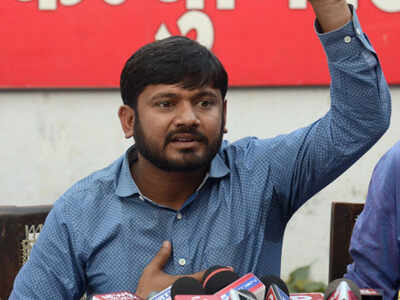
LUCKNOW: Uttar Pradesh government referred to the ‘tukde tukde’ incident in JNU when it included the clause in its ordinance on private universities in the state, mandating that the institutions will have to provide an undertaking that they would not allow any anti-national activity on their campuses.
The Uttar Pradesh Private University Ordinance 2019 was passed by the state cabinet on Tuesday.
Clarifying the government’s stand on seeking an undertaking from private universities that they would not allow any anti-national activity on their campuses in accordance with the ordinance, state education minister Dinesh Sharma told TOI on Wednesday that universities are centres of learning and there should be no room for such activities.
While the exact parameters of what constitutes anti-national activity have not been defined, Sharma said he referred to the 2016 ‘tukde tukde’ incident in JNU to state that “such activities” would not be allowed.
“Private universities should be centres of educational excellence and we will promote them in that fashion. But anti-national and anti-social activities, which weaken unity and disrupt education, will not be tolerated. In some universities, anti-national slogans have been raised like ‘Bharat tere tukde honge’ and objectionable terms used to define the nation. In UP, we are here to teach and study, not to engage in any activity that seeks to divide,” said Sharma.
Adding that universities would be held liable if anything objectionable was said or done on their campuses, Sharma said that the new ordinance would act as a shield for universities.
By making a university liable, he said, its administration would ensure that no anti-national activity was carried out on the campus as it would not want to be shut down. “Now they can fix their agenda and let those speaking on campus know what cannot be said or discussed. The ordinance guarantees the right to speech but will not allow any anti-national activity. One is free to criticise leaders and the country but demanding its division is not permitted,” added Sharma.
Claiming that the ordinance ensured independence to universities while equipping the government to act like a chowkidaar, the education minister added that even in the distribution of honorary degrees, the government would not be recommending names but only clearing those proposed by the universities. Giving the example of former JNU president Kanhaiya Kumar, who has been charged for his involvement in the ‘tukde tukde’ incident, Sharma said that if the court was to clear his name in the case, the government would have no objection if he were to be given an honorary degree.
“We have no objection to a university inviting Kumar to speak, but he cannot say the ‘tukde tukde’ kind of things there. The college cannot claim that it did not know what he or anyone would be saying,” he said.
While the ordinance has been passed by the cabinet and will be presented in the upcoming assembly session scheduled to commence from July 18, Sharma remained non-committal on when it would be implemented. The 27 private universities in the state will be given one year to change their Acts in accordance with Ordinance.
The Uttar Pradesh Private University Ordinance 2019 was passed by the state cabinet on Tuesday.
Clarifying the government’s stand on seeking an undertaking from private universities that they would not allow any anti-national activity on their campuses in accordance with the ordinance, state education minister Dinesh Sharma told TOI on Wednesday that universities are centres of learning and there should be no room for such activities.
While the exact parameters of what constitutes anti-national activity have not been defined, Sharma said he referred to the 2016 ‘tukde tukde’ incident in JNU to state that “such activities” would not be allowed.
“Private universities should be centres of educational excellence and we will promote them in that fashion. But anti-national and anti-social activities, which weaken unity and disrupt education, will not be tolerated. In some universities, anti-national slogans have been raised like ‘Bharat tere tukde honge’ and objectionable terms used to define the nation. In UP, we are here to teach and study, not to engage in any activity that seeks to divide,” said Sharma.
Adding that universities would be held liable if anything objectionable was said or done on their campuses, Sharma said that the new ordinance would act as a shield for universities.
By making a university liable, he said, its administration would ensure that no anti-national activity was carried out on the campus as it would not want to be shut down. “Now they can fix their agenda and let those speaking on campus know what cannot be said or discussed. The ordinance guarantees the right to speech but will not allow any anti-national activity. One is free to criticise leaders and the country but demanding its division is not permitted,” added Sharma.
Claiming that the ordinance ensured independence to universities while equipping the government to act like a chowkidaar, the education minister added that even in the distribution of honorary degrees, the government would not be recommending names but only clearing those proposed by the universities. Giving the example of former JNU president Kanhaiya Kumar, who has been charged for his involvement in the ‘tukde tukde’ incident, Sharma said that if the court was to clear his name in the case, the government would have no objection if he were to be given an honorary degree.
“We have no objection to a university inviting Kumar to speak, but he cannot say the ‘tukde tukde’ kind of things there. The college cannot claim that it did not know what he or anyone would be saying,” he said.
While the ordinance has been passed by the cabinet and will be presented in the upcoming assembly session scheduled to commence from July 18, Sharma remained non-committal on when it would be implemented. The 27 private universities in the state will be given one year to change their Acts in accordance with Ordinance.
World Cup 2019
Trending Topics
LATEST VIDEOS
More from TOI
Navbharat Times
Featured Today in Travel
Quick Links
Lok Sabha Election Schedule 2019Lok Sabha Election NewsDelhi Capitals teamMI team 2019Rajasthan Royals 2019RCB team 2019Maharashtra Lok Sabha ConstituenciesBJP Candidate ListBJP List 2019 TamilnaduShiv Sena List 2019AP BJP List 2019Mamata BanerjeeBJP List 2019 MaharashtraPriyanka GandhiBJP List 2019 KarnatakaAMMK Candidate List 2019BJP List 2019 WBLok Sabha Elections in Tamil NaduBSP List 2019 UPNews in TamilLok Sabha Poll 2019Satta Matka 2018PM ModiMahagathbandhanNagpur BJP Candidate ListChandrababu NaiduTamil Nadu ElectionsUrmila MatondkarNews in TeluguMadras High CourtTejashwi YadavArvind KejriwalTejasvi SuryaPawan KalyanArvind KejriwalYogi AdityanathJaya PradaSatta King 2019Srinagar encounter
Get the app








